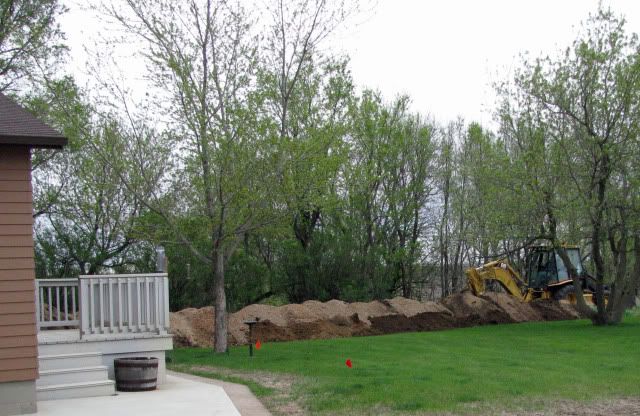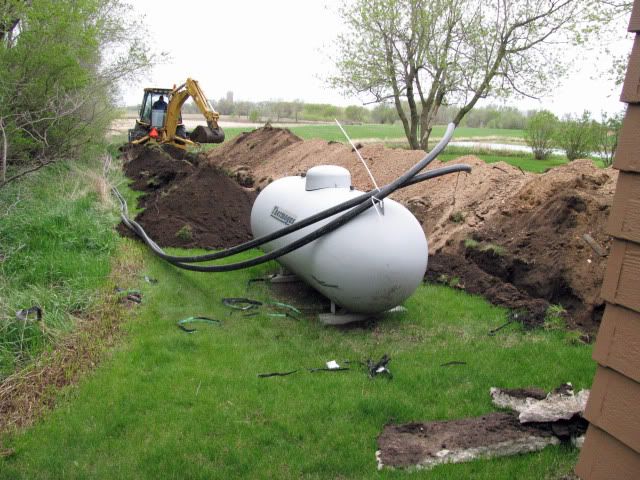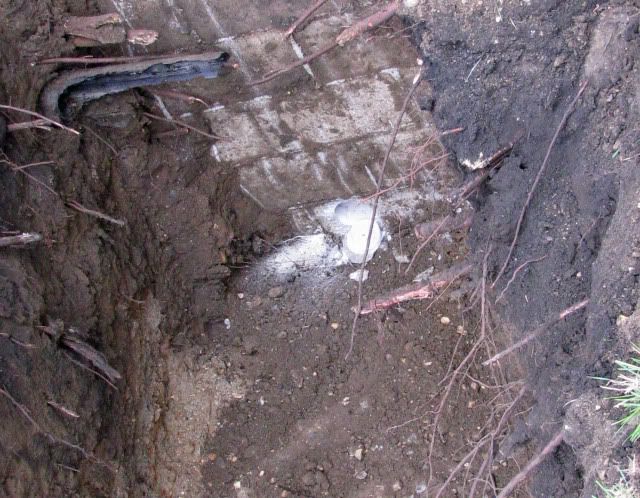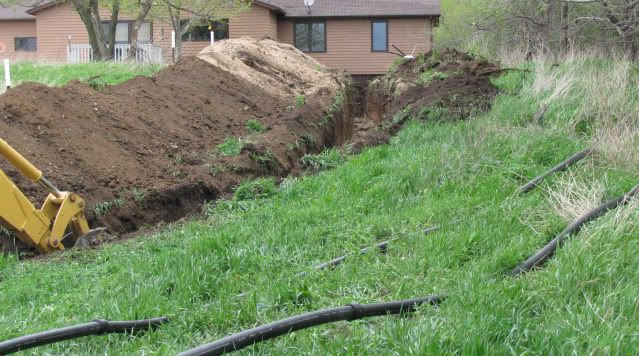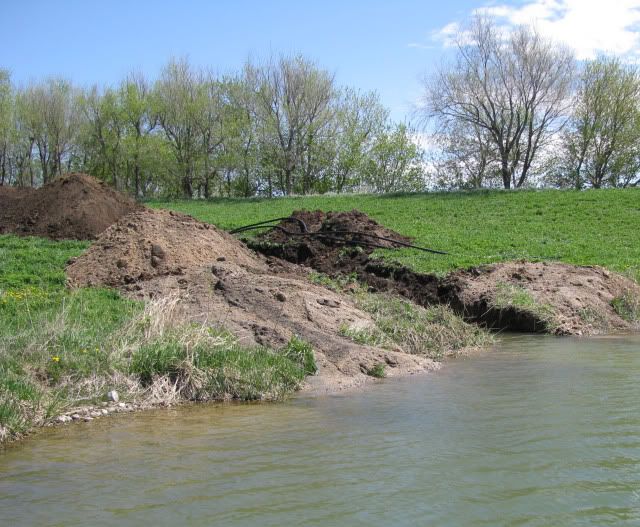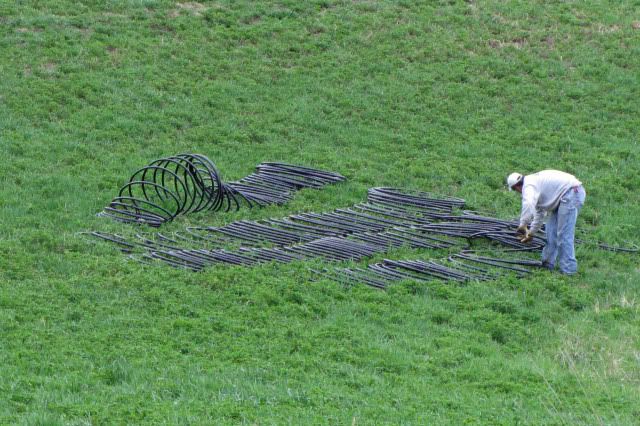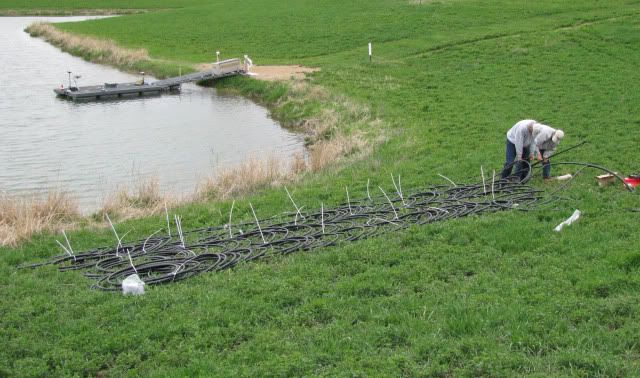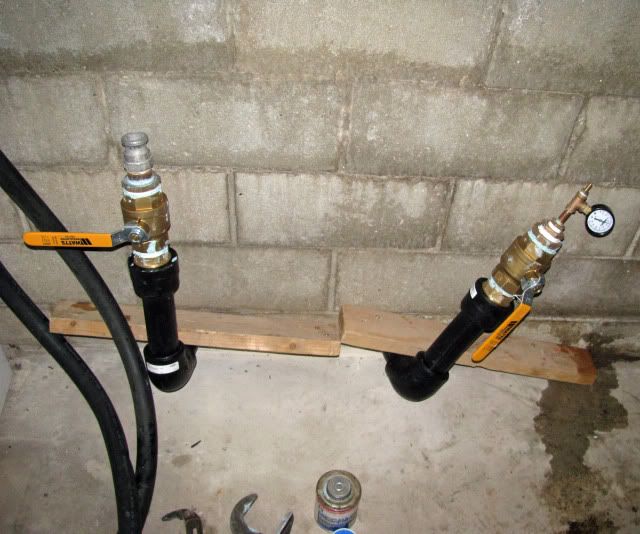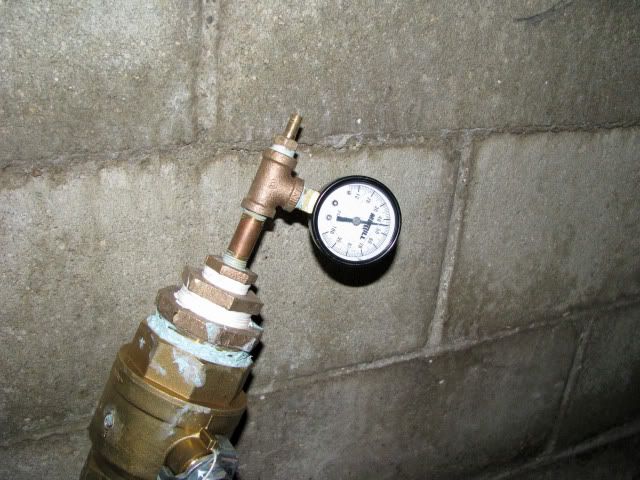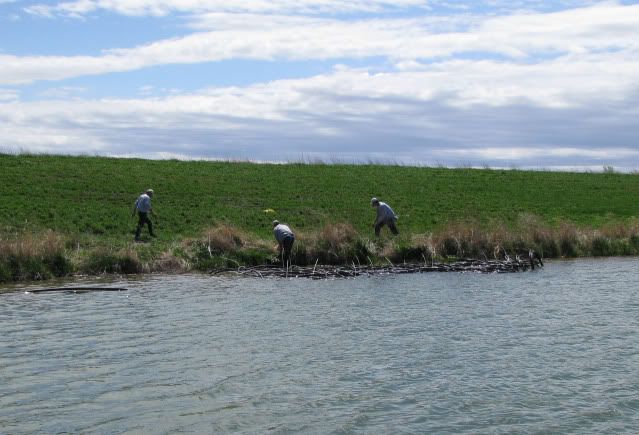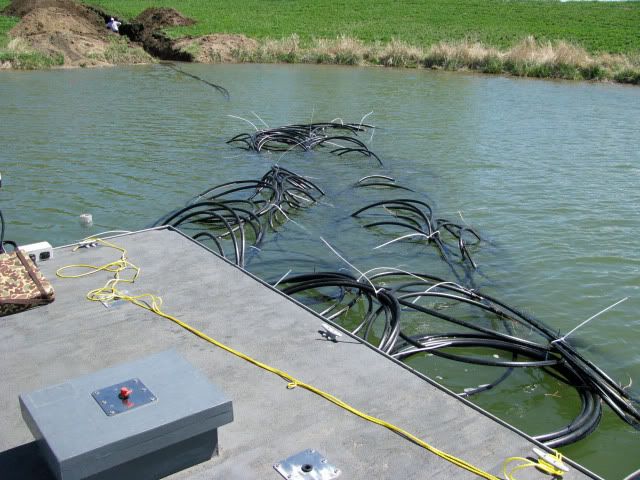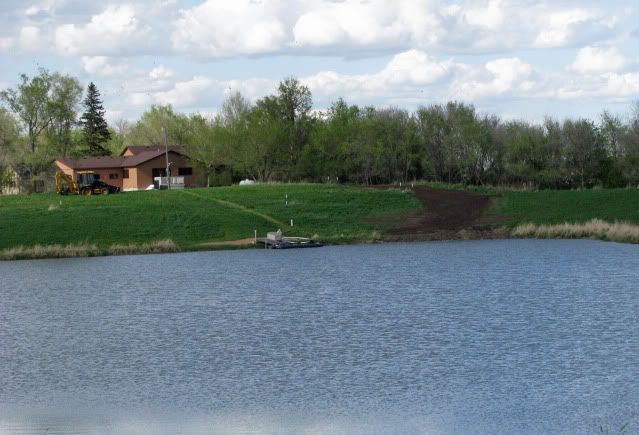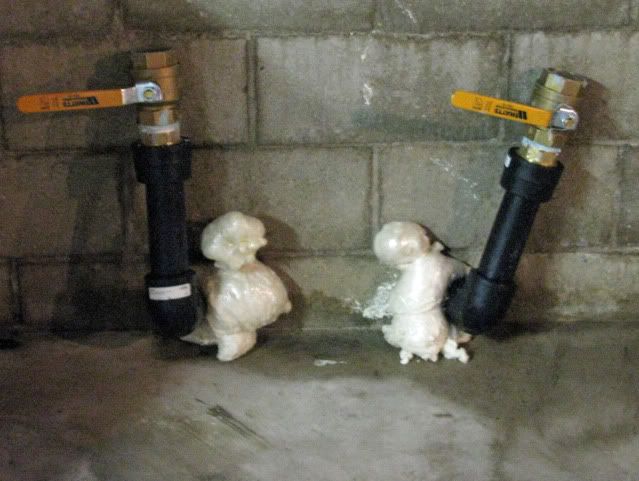Good photos. I have a few questions:
- how deep was the trench leading up to the pond?
- is anything done to keep the coils in the pond from moving around?
- I assume you are replacing an existing system. If so, did you compare costs for replacing the old system with a conventional one? (I'm curious about upfront cost comparisons)
Thanks. I'll be interested to see more as the install is finished.
- how deep was the trench leading up to the pond?
- is anything done to keep the coils in the pond from moving around?
- I assume you are replacing an existing system. If so, did you compare costs for replacing the old system with a conventional one? (I'm curious about upfront cost comparisons)
The trench is at minimum 6 feet deep.
The coils are held in place by their own weight filled with fluid and with 6 large concrete weights around the outside of the loop assembly.
Compared to our old system (a high efficiency LP furnace and an older AC unit) the annual savings in energy costs averages over $3000 per year. This includes the savings accrued from moving the house HE furnace to the shop. The shop currently has an old LP furnace with a chimney.
The cost for the system is $17500. Including the 30% federal tax credit the system is paid off with 4 years energy savings.
Any pictures of the manifold system?
Any pictures of the manifold system?
I guess that I didn't get one, sorry.....
Great stuff Dwight. Yet another benefit of having a pond. Four year payback - that is fantastic!
Great stuff Dwight. Yet another benefit of having a pond. Four year payback - that is fantastic!
If you get that Death Star Geo Transfer Unit built, you could suck heat and cool from peoples ponds without them even knowing!
Great stuff Dwight. Yet another benefit of having a pond. Four year payback - that is fantastic!
If you get that Death Star Geo Transfer Unit built, you could suck heat and cool from peoples ponds without them even knowing!
It's a good system, except for the external thermal exhaust port, about 2 meters across (just smaller than a wamp rat).
If you get that Death Star Geo Transfer Unit built, you could suck heat and cool from peoples ponds without them even knowing!
It's on the list. Right now the GSA budget is stretched a little thin. We're trying to design a system to remotely implant tracking devices in "persons of interest." Long distance accuracy of the of the implant device is not great right now. On the upside though we know where TomG's next door neighbor is all times though.
Wamp rat? Naaa, never mind. I'm thinking that what ever that is I don't want to know.
Looks great Dwight!
One question I have. Is'nt that trench going to settle without a small mound over the dug area to allow for recompaction??
BTW, now that you'll have a warm winter haven, tilapia will make Darlene (x at least 6) pop that 10 pound hurdle quicker so you can collect from Cecil!
Wamp rats LOVE GSF and pantyhose!
Methinks Theo left off an "S" in front of Wamps.
No, but I did mispell it:
Womp Rat And there were
swamp womp rats!
One question I have. Is'nt that trench going to settle without a small mound over the dug area to allow for recompaction??
It is mounded to compensate for settling. My photography just doesn't show it.

I'm an idiot, perhaps Dwight you can break it down for me as to how the Geo project works as compared to a standard heating and cooling system? It seems so interesting to me...
I asked that same question and got told to look it up on the internet. Here is a brief simple explanation:
http://www.stantonhomes.com/Docs/Geothermal_Systems_Information_Raleigh_Custom_Homes_Builder.pdf
In simple terms the geothermal system works like a window air conditioner. If the air conditioner is installed normally it pumps cold air into the house. If it is installed backwards it pumps heat into the house.
The geo unit pumps heat from the earth rather than from the air. In ac mode the geo unit pumps heat into the earth and in heat mode the geo unit pumps heat out of the earth.
May I ask approx cost of a project like this?
Our heating system is radiant and it is terrible, and our AC system is on its last leg, so we are fixing to upgrade in a couple of years anyways. We are about 100 ft from the pond.
Dwight, your system is very similiar with what we did (see other geo threads). Costs on target. I finally got a yearly anaylsis done and my savings (even with some initial problems that ocured) is running $3,800 a year so I still hope to recoup costs in 5 years.
Things that may help you along the way, is I ended up having them come back and put more 'spacers' between coils, my coils were more compact whereas yours are spaced maybe twice the length. They also added an extra coil, no costs, which is just a bonus for me. I am going with a new thermostat that tells me when my 'heat strips' do kick in. After much learning and watching my electric bills, which I did have an extremely high month (but come to find out so did everyone else in the area with geo). I have worked thru the issue and bottomline, is my total year came in below target so I am quite pleased. My geo continues to outperform my expectations. It is comfortable, barely notice it, I don't have the nose bleeds like bofore. I don't miss the high propane bills. Worthy investment. Keep us posted on your progress.
Our Geothermal system has now been in operation for about 24 hours. I have included some photos with a brief explanation.
The new thermostat controls three heating stages and the two cooling stages. The two stage compressor provides heating and cooling stages one and two and the electric heat module provides the third heat stage in extremely cold weather. The Geo unit blower runs at low rpm (740) when no heat or cooling is required. This provides continuous circulation through out the house. The results are clean air and stable room to room climate control.
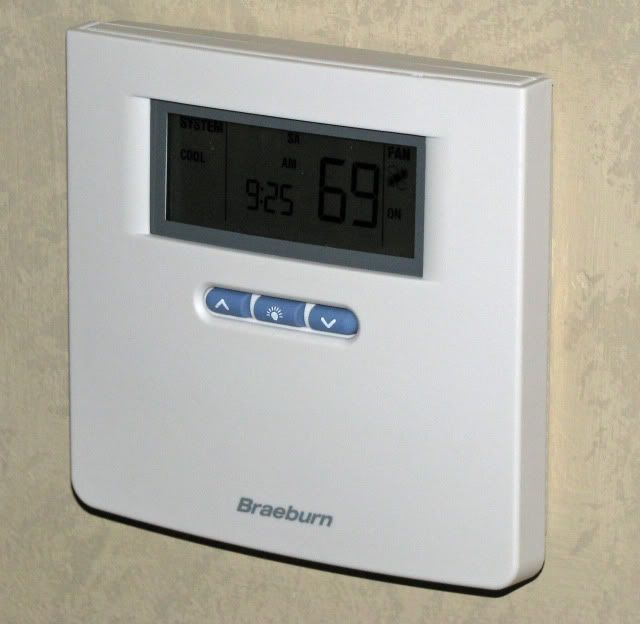
This is the entry point for the pond loop.
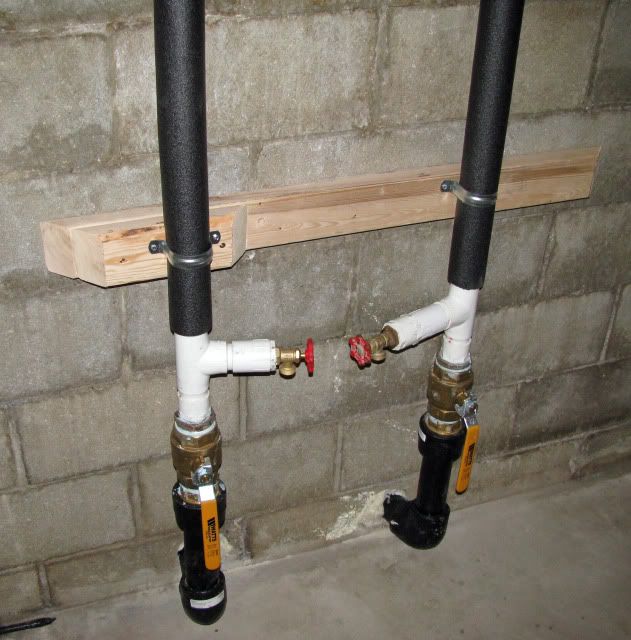
There is a significant amount of work involved to plumb from the entry point to the Geo unit.
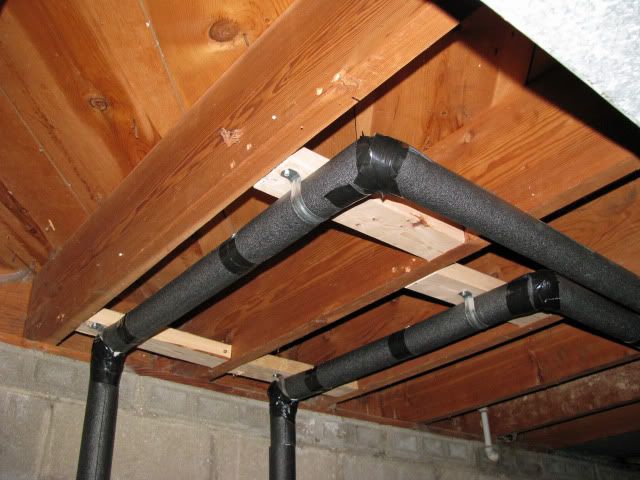

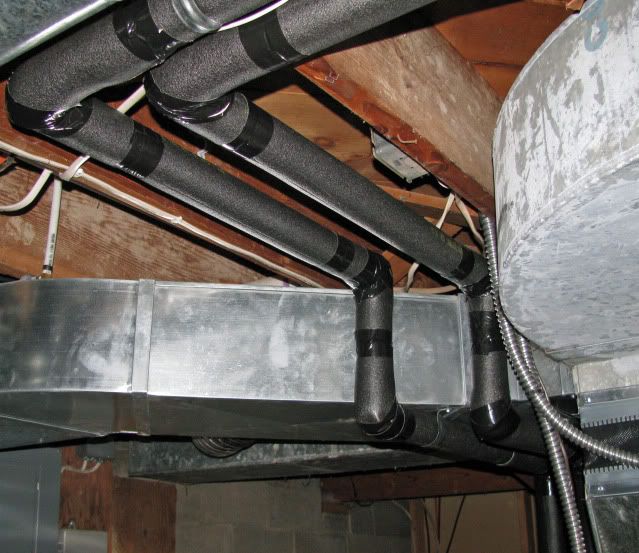
I added two 220v circuits, a 50 amp for the Geo unit and a 60 amp for the auxiliary electric heat. Wire for both is 6 gauge copper.
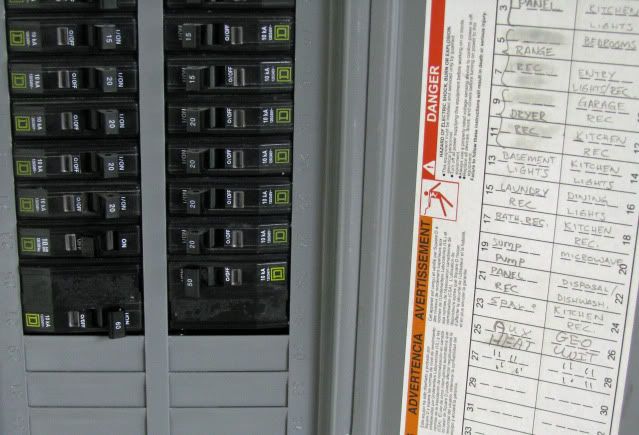
The installed Geo unit.
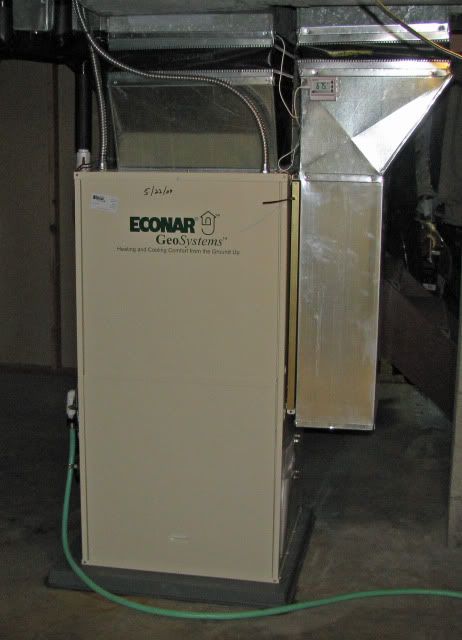
Plenum air temperature monitor. At the time the photo was taken the unit was in circulation only mode.
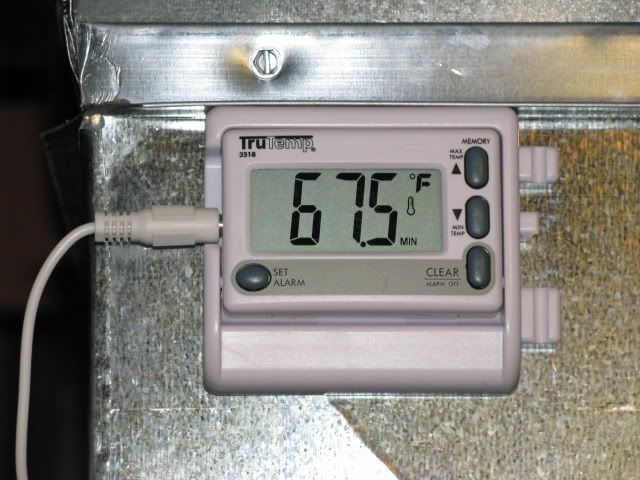
Water pumps.

View of the back of the pumps, the fill tube and level indicator, and the flow meter.
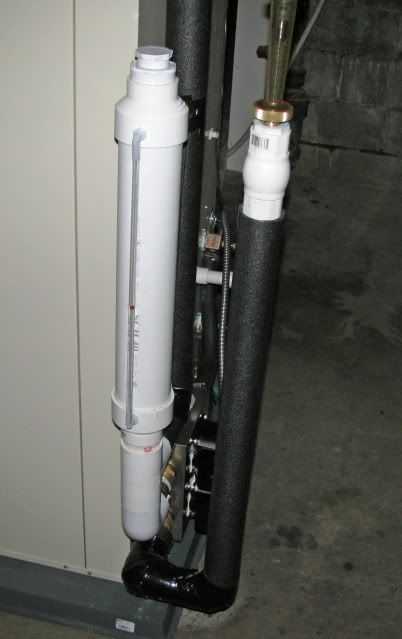
Close up of the level gauge.
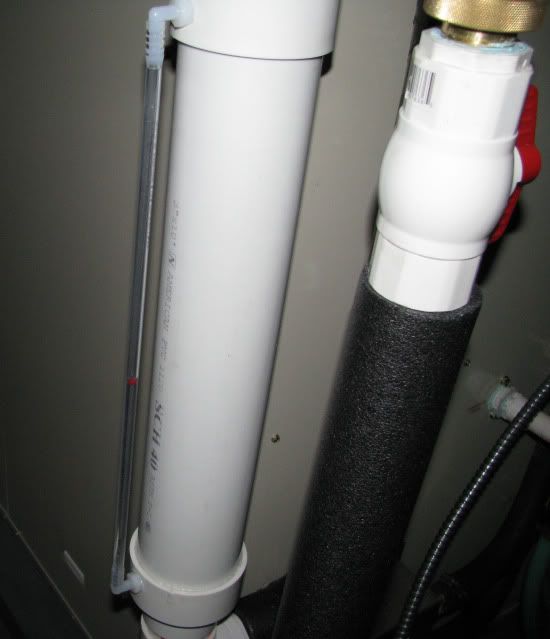
Close up of the fill opening/plug and the flow meter. The water/antifreeze solution is circulating at 11 GPM.
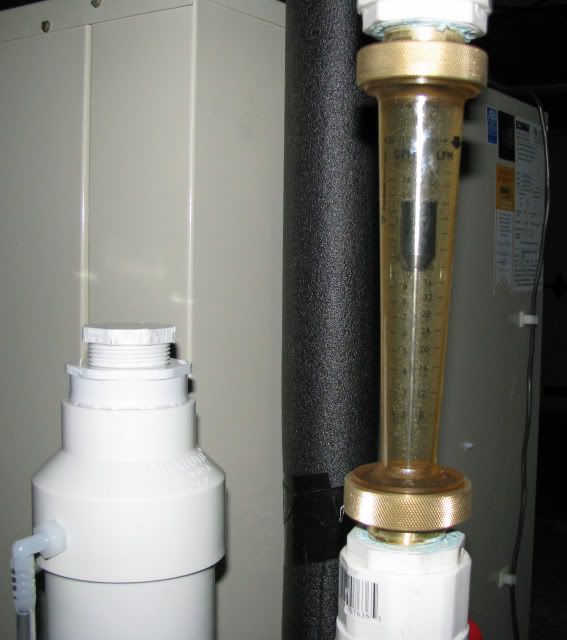
Now it follows that the high efficiency condensing furnace removed from the house needs to be installed in the shop. Again proving the adage that a manís work is never done.

The electric company is coming out tomorrow to install the submetering so we get the cheapest rate for heating and cooling. 4.5 cents per KW.
The old house furnance is now installed as the new shop furnace. It is never too early to be prepared when you live in Minnesota!

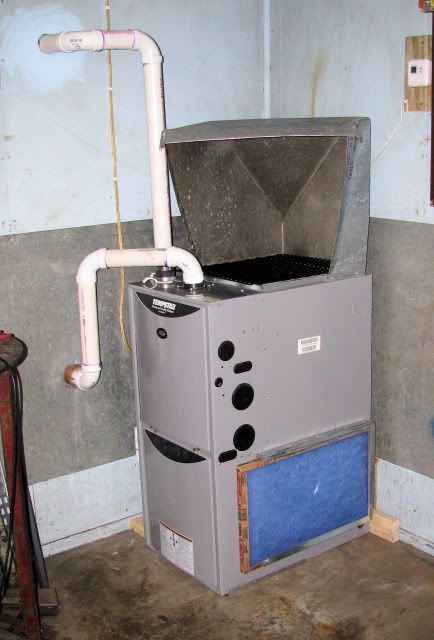
I sense the ductwork was somewhat simpler with this installation.
Yes, it was a lot easier. It was recycled from the old shop furnace. It is ugly, but it works.
We had a problem with our Geo Unit not putting out enough heat to keep the house at 70 degrees last night (Low outside temp in the vicinity of -0 F with 35-45 mph winds). The inside temperature went down to 67 F and then hovered there with the unit running all night.
It is a three stage unit (2 compressor stages and the 3rd stage is auxiliary electric resistance). It appeared to me that only the first stage was running so I took some plenum and loop in-out temperature readings and called the heating company about it. Since the loop in and out temperatures were only 3.4 degrees apart and the heat plenum temperature was 82.4 degrees they too thought only the first stage was running.
Their tech came out and determined that the thermostat was setup for a 2 stage system not 3 stage. So, we have been running on the first stage through the cooling season and (until today) the heating season with no apparent problems.
It was an easy programming change and we are now loaded for whatever nature hangs on us.
I turned the circuit breaker off on the 3rd stage since I really prefer to pay the electric company as little as possible.
Tonight we are headed to -15 F with some wind so the 2nd stage will get to finally do its job. The Tech and I concur that we may never need the third stage unless something extreme occurs, like -30 F and 50mph winds. I am fine with that. Service call charge $0.00. I am fine with that too.

Thermostats just keep getting more complicated.
Thermostats just keep getting more complicated.
They have more stages than Boston's string of album releases
Yes, this one has a "flush all toilets @ time" function.
And in your location it needs every function you can think of and they better work right the first and every time least you turn to popsicles.
And in your location it needs every function you can think of and they better work right the first and every time least you turn to popsicles.
No worries, we live in the warm part of Minnesota.
No worries, we live in the warm part of Minnesota.
HA! Warm part of MN. There is no such thing, except in July and August. hehehehe
Nice system! We've had ours for a year now and love it.
In addition to the Federal tax credit, we were able to get an energy efficiency credit from our electric coop for installing a geothermal unit. We had to fill out 2 pages of paperwork and now we have a big fat credit on our account. We won't be paying for electricity for several years.
Between the tax credits, electric company credits, and energy savings these things really do pay for themselves pretty quickly.
Ack, thanks. You are right about the payback. It happens quickly.
Now that our thermostat is programed correctly everything works according to initial design parameters. It still runs on the first stage mostly.
One question for you. Does the Geo keep the and area of the pond open all winter if you live somewhere that it gets down in the single digits at night?
Maybe I am not understanding how this works?
Thanks
The Geo system closed loop lies on the bottom of the pond in 10 feet of water so it has a negligible effect on water temperatures. I don't see how it could keep water open in an pond situation unless the pond was extremely small.
Dwight:
If it's a closed loop system, doesn't it take heat "out" of the pond in the winter, and put it back "in" during the summer?
Yes esshup you are correct it takes heat from the pond in the winter and put it in during the summer. Somewhere on the forum they crunched the numbers and it will have very little effect on the pond temp.
As noted above, pond loops really have very little affect on the pond. The additional loop and making sure there are lots of spacers in the loops has made all the difference in how our geo runs. It's is comfortable and even with single digit temperatures, it ran beautifully. We have a Honeywell thermostat that shows when your heat strips kick on--we changed ours out to one last year and highly recommend one. Thus far this year, the geo is running absolutely great.

Dwight, all your costs was right in line with ours and I'm figuring a 5 year payback. The only thing is once you get out of warranty, if you need service, the service for a specialized tech is on the high side of things compared to your older system. Oh, well....dot
The overnight low last night was -32F and at 11:00AM this morning it is still -20F. The Geo unit ran on the first and second stage most of the night. With a setting of 70F on the thermostat, the actual inside temperature never dropped below 69F. This means that the third electric resistance heating stage may never run. I can't imagine conditions in our locale that could cause the inside temperature to drop to 67.5F degrees (the resistance heating stage set point).
I have some understanding of how the system works. I am still amazed that a whole house can be heated in -32F temperatures by 40 degree pond water!

I'm amazed by this as well Dwight. When we eventually build our home on our property we are definitely going to install geothermal. For us it will be as much about the cooling in the summer as the heating in the winter.
Thank you, Dwight,
The overnight low last night was -32F and at 11:00AM this morning it is still -20F.
for helping me enjoy our balmy 9 deg F weather today.
I can't imagine conditions in our locale that could cause the inside temperature to drop to 67.5F degrees (the resistance heating stage set point).
How would you rate the home insulation (particularly ceiling/attic) and airtight-ness (new word)
I'm curious as we would like to build some day and planned on a geo unit. I was under the impression that a land based unit was more efficient. Did you compare costs and efficiency of pond vs. land based units? If so, how did they compare? Thanks!
I see where some of you figured a pay off for the geo thermal in 4 and 5 years and in my mind I try to figure out how it is figured? If in one case the cost totaled out at $17,500. If after the credits you had around $12,000 to spread out over 5 years this would figure out to saving over $2000 per year. I would assume by this the propane cost was extremely high. The convenience of the geo thermal would be extremly nice. I am trying to convert everything over to my Heat pump situation. I know that during cold weather I would be having electic heat as the heat pump could not convert the cold air to heat. Now if my total heating and cooling was about $1800 per year and this is about $150 per month. Could you with geo thermal give me some figures on how much I could realize in geo thermal savings---please.
JHAP: I'm amazed by this as well Dwight. When we eventually build our home on our property we are definitely going to install geothermal. For us it will be as much about the cooling in the summer as the heating in the winter.
We have a 7 month heating season, a 3 month air conditioning season and a month each spring transition and fall transition.
Brettski: How would you rate the home insulation (particularly ceiling/attic) and airtight-ness (new word)
Our home is approximately 60 percent old construction 40 percent new construction. All the windows and doors are current double pane. The siding is relatively new on average and has taped one inch bead-board between the wall and siding.
Rangersedge: I'm curious as we would like to build some day and planned on a geo unit. I was under the impression that a land based unit was more efficient. Did you compare costs and efficiency of pond vs. land based units? If so, how did they compare? Thanks!
In our area a pond based system is far superior to a ground system. There are several reasons for the difference. We have ground water flow in our pond that keeps the water temp around the loop constantly refreshed and very stable. Our pond is a pit type pond dug into the ground water rather than an impounded surface water type pond. Our soil below the frost line isn't soil at all, but gravel. When a Geo loop is in the water the transfer surface is 100% while in soil there small gaps and voids in the soil which affects the transfer of heat.
Deaner: I see where some of you figured a pay off for the geo thermal in 4 and 5 years and in my mind I try to figure out how it is figured? If in one case the cost totaled out at $17,500. If after the credits you had around $12,000 to spread out over 5 years this would figure out to saving over $2000 per year. I would assume by this the propane cost was extremely high. The convenience of the geo thermal would be extremly nice. I am trying to convert everything over to my Heat pump situation. I know that during cold weather I would be having electic heat as the heat pump could not convert the cold air to heat. Now if my total heating and cooling was about $1800 per year and this is about $150 per month. Could you with geo thermal give me some figures on how much I could realize in geo thermal savings---please.
The savings are far greater in more extreme climates like Minnesota. See my comments to JHAP at the beginning of this post.
Try this calculator:
Geo Savings Calculator
Dwight:
I ran the calculator, and I may be reading the calculator incorrectly. Here's what it said:
System Comparisons:
1 Geothermal Heating and Cooling with Hot Water Generator
2 Natural Gas Furnace, 91% eff. / 10 SEER Air Conditioner / Natural Gas Water Heater
3 Natural Gas Furnace, 80% eff. / 10 SEER Air Conditioner / Natural Gas Water Heater
Annual heating, Cooling, and Hot Water Costs:
110 year old, 2300 sq. ft. home
South Bend, IN
System Heating Cooling Hot Water Totals Avg Monthly
1.......$1,606...$253.....$912....$2,771....$231
2.......$1,977...$643.....$607....$3,227....$269
3.......$2,213...$643.....$607....$3,463....$289
Electric rate: $0.143/kWh
Natural Gas Rate: $1.06/ccf
Does this mean that I'd only be saving an average of $38/month over the current system (system 2 in the data)?
If we get to low single digits, the third stage (heat strips) kick in for about an hour. The difference is with the new thermostat, we KNOW is it on...previously we never could tell without going downstairs.
That is amazing, that you haven't hit third stage; when we thought that, we ended up with quite an eletric bill when we first installed the geo (and after some fine-tuning the problem went away).
I'd be curious what others have experienced with when their heat strips do kick in.
We are definitely still pleased with the geo system inplace.
Does this mean that I'd only be saving an average of $38/month over the current system (system 2 in the data)?
It is all about the extremity of your climate and the cost of energy in your area.
Natural gas is cheap compared to heating oil, LPG and electric on a heating unit per $ basis. If you were comparing Geo to oil or LPG heating your numbers would be quite different. Enjoy your natural gas while you can!
If we get to low single digits, the third stage (heat strips) kick in for about an hour. The difference is with the new thermostat, we KNOW is it on...previously we never could tell without going downstairs.
That is amazing, that you haven't hit third stage; when we thought that, we ended up with quite an eletric bill when we first installed the geo (and after some fine-tuning the problem went away).
It probably has something to do with the sizing of your system. How many tons have you?
5 tons and five loops in the pond...they figured we'd used 105 hours of heat strips during the two coldest months due to heat loss from the house??? My husband thinks we maybe need a couple of more loops. May be to soon to tell, this is only our second year with geo. It's 18 degress right now and we're running straight off geo (no strips) and i know the strips come on like 1, 2, 3 or 4 at a time.
Ours is a 5 ton with 4 pond loops and 1 electric resistance heat "strip" that never runs, even at -32F
What brand and model is your Geo system? How well is your house insulated? I am curious about the large difference in what we are experiencing.

Hmmmm...that's interesting, big differences.
Carrier GT-PY (50YD) Two-Stage Puron(R) Series
ClimateMaster Fow Controllers
Thermostat: Honeywell VisionPRO TH800 Series (we changed our thermostat to this as it is more user friendly and shows when strips kick on etc)
I was thinking of switching to Geo myself and I'm interested in both of your systems, plus what you've done to insulate each of your houses.
Hmmmm...that's interesting, big differences.
Carrier GT-PY (50YD) Two-Stage Puron(R) Series
ClimateMaster Fow Controllers
Thermostat: Honeywell VisionPRO TH800 Series (we changed our thermostat to this as it is more user friendly and shows when strips kick on etc)
I compared the specs our systems and they are very similar other than brand name. Ours is an Econar. We have the same Honeywell thermostat.
We are down comparing loop length, loop water temperature, square foot area heated/cooled, structure insulation and structure tightness, etc.
Here is our data:
Total pond loop length including feeder lines: 1900 feet
Water temperature in the loop location: 40-41 F degrees
Area heated/cooled approximately: 1800 square feet
Ceiling height: 8 feet
Ceiling insulation on average: 15 inches
Wall insulation on average: 6 inches
Tightness: (on a scale on 1-5) 4
I was thinking of switching to Geo myself and I'm interested in both of your systems, plus what you've done to insulate each of your houses.
I think my response above should help.
Dwight, what do you mean by "tightness?" (No need for any hijacks here - you guys know who you are!) I have heard of geothermal, but never really understood it. I've enjoyed reading and learning about it in this thread as it may be something I'd consider doing when we build on the farm one day.
Dwight, what do you mean by "tightness?"
I got it wrong, it is airtightness (Brettski's word). It is the quality of the seal of your windows, siding, etc. from outside temperatures and wind.
Thanks for the "duh" moment, Dwight! Seems pretty obvious now that you explain it to me! Thanks. I'm going to do some research on geo systems. I think we have an outfit nearby that does them and I know the guys somewhat, so they may be a good source of info as well.
Thanks Dwight. Airtightness is my biggest problem, plus I don't think my walls are insulated as well as they could be, but I tried, I really tried.
The house is 110+ years old, and when I re-sided the house I tore off 2 of the 4 layers of siding. I then drilled holes in all the wall cavities to blow in insulation, but at some point in the past, someone put fiberglass insulation in the walls. I couldn't get any cellulose into the walls other than the one South facing wall. The living room is actually an addition, made from hollow block. I firred out the block, and put 1" to 2" thick foam sheets on the walls, then 1/2" OSB. That brought the block wall out to the same level as the origional house exterior walls, and I then wrapped/taped the house with Tyvek.
All the wood single pane double hung windows have been replaced within the past 2 years, and I blew 20" of cellulose in the attic last Fall. The biggest problem is the cold that migrates up into the house from the crawlspace. Hopefully, the plans for next year is to re-do all the supply water pipes with Pex, and upgrade the galvanized pipe to cast iron drain system with Plastic to Cast iron, then call someone in to foam the underside of all the floors and heat ducts. Currently, the heading ducts run under the house in the crawlspace (counterflow forced air furnace) and they are single wall uninsulated metal ducts.
My only concern with going to Pex vs. copper is any rodents chewing on them. Right now, the water pressure in the house is terrible because it was put together with whatever galvanized pipe they could get, from 3/4" to 3/8". I helped things a bit by removing the 3/8" galvanized pipe they had feeding the water heater and changing that to 3/4". The current plan is to go with Pex and not have any copper fittings in the crawlspace that could freeze and crack. The downside to that is if the Pex freezes, I can't use an open flame as a heat source to thaw the pipe.
Dwight, See below: (thoughts)
Total pond loop length including feeder lines: 2500 feet
Water temperature in the loop location: 52 F degrees (in Nov)
Area heated/cooled approximately: 2500 square feet living
Ceiling height: 90 feet (with two rooms with cathedral ceilings (18')
Ceiling insulation on average: R38 rating (batting)
Wall insulation on average: R30 rating (batting)(3/4 brick home/siding sitting on a hill with no wind breakers) Exterior walls are 6".
Tightness: (on a scale on 1-5) 4
Dwight, See below: (thoughts)
Total pond loop length including feeder lines: 2500 feet
Water temperature in the loop location: 52 F degrees (in Nov)
Area heated/cooled approximately: 2500 square feet living
Ceiling height: 90 feet (with two rooms with cathedral ceilings (18')
Ceiling insulation on average: R38 rating (batting)
Wall insulation on average: R30 rating (batting)(3/4 brick home/siding sitting on a hill with no wind breakers) Exterior walls are 6".
Tightness: (on a scale on 1-5) 4
I am going on the assumption that your ceiling height is 9 feet, not 90 feet.

All of those specifications tell me that all is well in your design and implementation.
Something must be amiss elsewhere. Without actually observing your system in operation I suspect: One or both of your circulation pumps are bad, otherwise not operating properly or there could be a blockage somewhere in either or both sides. One of your compressor stages is not functional or is functioning at a very low level or both of them are functioning out of spec.
I personally would have someone come and test the system, possibly a 3rd party if your heating contractor says everything is good.
I am no expert on the inner workings of a Geothermal system, though I do enjoy a good old fashioned troubleshoot.
Thanks, yes 9' --

I'm thinking in your line of getting another opinion to check it out. I don't buy the heat strip theory as that was option--I didn't have to put that in but choose to.
Let us know what you find out.
A point of comparison,or not.
The heat load is based on cubic area among other things. There is ~60% difference in the size of these two structures depending on the actual area of the cathedral ceilings in Mark's house.
I ran an on line heat load calculator for two simplified structures with the only differences being location and size. 30x60x8 in Deluth, Mn. and 50x50x9 in Evansville, In. The In. location showed a 13% greater heat load, accounting for climatic differences.
Of course this does not really tell us anything, but concluding that something is wrong with Mark's system may be a bit premature based on the very simplified data set provided.
Having it checked by a third party is a good idea, especially if you have a competent 3rd party. I had an energy audit run on a customer's home we were doing some unrelated remodeling on about 15 yrs. ago. The tech found a large ~.5ft/2 hole in the return air pulling unconditioned air out of the attic. This was about a week after his AC tech had checked out and blessed the system.
Plan - I have my second check yearly check this Monday by the installer. This will also give some more stats on the system performance at present along with incoming/outgoing temperatures of the pond loops. Then, we will have a 'second' person check it. We are learning this geo system more and more and still feel there is something not quite right as my hubby and I both go to different forums and everyone seems to not have to use the strips (or as much). My hubby still thinks it's with the pond loops....not the unit. IMO - if i'm going to pay a couple of months of high electric bills and for them to keep coming check it out--where's my savings? I'll let you know what gives.
With your Geo systems, how many gpm does the pump circulate thru the pond loops?
Do you know if that figure would be different for an open system?
Actual flow on our system a bit over 11 GPM. I am not sure on an open system, but I think it would be similar for a like sized system.
I have had GEO since 1978. I now have two units, they were both open loop drawing from my well. About 3 years ago I put in a closed loop system in my lake for the larger, newer unit. My temperature at my vents dropped from 104 too 80 degrees. I think the reason is the lake temp is 37 degrees vs 61 degrees well temp. I measured yesterday and the difference between the two units is almost 20 degrees. I am wondering why Dwight didn't put the pipe in trenches instead of a lake loop. It would seem to me that the temp in the trenches would be warmer than the lake. we are in the process of building a new lake on new property and I am thinking I will put the pipe in the ground instead of the lake. I am sure there is a reason. thanks for listening Wayne Cooper Charlotte
I am wondering why Dwight didn't put the pipe in trenches instead of a lake loop.
Way lower excavation costs?
I am wondering why Dwight didn't put the pipe in trenches instead of a lake loop.
Sand and gravel are poor conductors of heat. Water is a good conductor of heat. The difference in the ground water temperature and the water temperature on the bottom of the pond is only 4 degrees. Since the ground loop would have been in sand and gravel, there was no contest.
...I think the reason is the lake temp is 37 degrees vs 61 degrees well temp. I measured yesterday and the difference between the two units is almost 20 degrees... Wayne Cooper Charlotte
My hubby just checked our pond temperature yesterday, it was 35 degrees at the bottom so we don't think there would be much transfer....we're starting to think we should have put it in the ground...our geo is just not keeping up in the winter...the heat strips are being used often and even in the 30s--not long, but do come on...just doesn't seem right...summertime we don't have problems... Now I should say we do have a windmill in our pond that circulates the water and keeps the top from freezing--does anyone have a windmill in the pond along with their geo...???
If your house was a story and a half and you now have two units would you need two seperate closed loop systems? Or would there be a way that you could run two systems off of one loop.
Tech came out but has to return tomorrow. Went look at unit in basement (it is frozen so it has to defrost so he can come back tomorrow and try to figure out what is wrong). Maybe it isn't the loops, maybe I have a "lemon" unit. Oh well, should know more today.
Just great.

Seems like you cannot have aeration and pond loops, causes stratifcation. And we found out today that our loops have floated to the top and are stuck to the ice! I do not want to compromise giving up our windmill aeration. I have started another post under Aeration. Saga continues....
Can you move your aeration to a shallow area? If you bottom water temperature is 35 degrees, your aerator is moving too much "warm" water from the bottom to the surface.
I don't think the aeration is really the problem. If your pond loops floated to the surface then there is air in the system. Since your geo compressor is "locked" and there is air in the system I am hoping you don't have to pay for the repairs!
Systems in our area are designed to function efficiently with a 32F degree loop temperature. Our Geo contractor says he has two units that are looped in sandy soil and these will get in to the mid to high 20F degree range and still continue to produce heat.
Dwight, I'm learning more and more.... First, I stand corrected, I have 1800' of pipe in my pond loops. I did go back to your picture post and i notice yours is in a slinky formation, mine is coiled. For one thing, coiled is Ok in the South, slinky/matt in the North, yours looks to be in the slinky formation. Aeration, from most reading I'm doing is bad for geo...are you running an aerator in your pond? Still working thru my geo problems with the installers...
Would geo be beneficial in Arkansas? It's not nearly as extreme as Minnesota in the winter and we usually have HOT summers. We will start building our house this year. It will be about 5000 square feet, and we will be using foam insulation so the house should be pretty airtight.
It doesn't seem like geo should cost 2-3X more than conventional HVAC. It's not that much more equipment, if any. You have the cost of the tubing. Am I missing something??
Aeration, from most reading I'm doing is bad for geo...are you running an aerator in your pond? Still working thru my geo problems with the installers...
I don't think aerators or circulators are intrinsically bad for Geo. We have a circulator that in many ways functions like an aerator as both move water and a lot of it. The location of the aerator/circulator is what is important.
Our circulator is within 30 feet of our geo-loop. The geo-loop sits on the bottom the pond in ten feet of water. The circulator is in 2 feet of water so it has very little effect on the water on the bottom where the loop lies.
Would geo be beneficial in Arkansas? It's not nearly as extreme as Minnesota in the winter and we usually have HOT summers. We will start building our house this year. It will be about 5000 square feet, and we will be using foam insulation so the house should be pretty airtight.
You need to talk to a geothermal contractor in you area to get some idea of the potential. Once you have that, you can do your own research to determine what you want to do. Every situation/location is different.
It doesn't seem like geo should cost 2-3X more than conventional HVAC. It's not that much more equipment, if any. You have the cost of the tubing. Am I missing something??
Geo-units are complex and it is not inexpensive to run a backhoe (or whatever earth digging/moving equipment) for a couple days.
I know that excavation and heavy machinery usage can get quite expensive. But if the loops are at the bottom of the pond, there isn't much excavation. That's where I'm confused. Seems that there's about the same amount of equipment, maybe a little more, as regular HVAC.
My plan is to use my pond as the heat exchange point. The pond is 28 ft. deep at the deepest spot. This is where I would like to place the loops. Later on, I plan on placing an aerator about 15-18 ft. deep. Hopefully, this won't interfere with the bottom layer of water and I won't have problems with the geo.
I found this:
1: Why are Geothermal Systems so expensive?
Answer: The equipment costs close to the same as a quality name brand high efficiency furnace and air conditioner. The additional cost involves the installation. An open loop usually requires less capital investment than a closed loop system if the well and discharge are already existing.
A horizontal loop requires excavation equipment and pipe installation.
A vertical loop requires drilling and excavation equipment and pipe installation.
Special tools are required to fuse the plastic pipe together underground.
Special flushing and charging equipment is required to clean, air purge and freeze protect the earth loop once it is connected to the geothermal unit.
Ductwork is somewhat larger than with other furnaces because geothermal systems move about 40% more air than fossil fuel systems of similar heating capacity.
Ductwork is somewhat larger than with other furnaces because geothermal systems move about 40% more air than fossil fuel systems of similar heating capacity.
Dwight:
I didn't know this, nor did the geo company say anything about this when they quoted me a system. They were going to use the same ductwork.
I believe you switched to geo, correct? If so, was your duct work increased in size? Your system seems to work very effeciently and the way that your system works is how I'd expect a geo system
to work, that's why I'm asking.
I believe you switched to geo, correct? If so, was your duct work increased in size? Your system seems to work very effeciently and the way that your system works is how I'd expect a geo system to work, that's why I'm asking.
There are thousands of Geo-systems working just fine that have been fitted to existing homes. The 40% larger ducting is ideal in new construction.
Since Geo-systems move more air you will notice an increase in the "breeze" when directly in front of a register. Do they still call them registers?
This 40% rule is for heat pumps. It's not restricted to geo systems. The heat rise is lower with a heat pump than most other systems. More air at a lower heat rise has to be moved in order to have an equivalent heating capacity.
If the duct work is not sized properly you can have a system that is noisy and feels very uncomfortable even though the system can maintain the set point on the T-Stat. This is the most common complaint about heat pumps.
The problem is actually compounded in a retrofit because most duct systems are undersized to begin with. A natural gas unit with a supply temp of 120F. feels warm even at high velocity. A contractor/builder can add profit by undersizing the duct system with few complaints.
A heat pump with a 90F supply temp will feel cold if you are in the air stream. Your wife wont care if the building temp is "correct" if she feels cold.
The heat pump should be sized according to Manual "J".
The duct system should be sized according to Manual "D".
If your contractor is not using industry standards you will likely end up with a poorly functioning system.
So are you saying tejasrojas that a geo-system is not a good retrofit in a house with an existing duct work or that if retrofitting you just have to ensure it is sized properly? (just trying to understand for future reference).
Geo System Cost.........................+$ 17,100
One Time 30% Tax Credit.................-$ 5,130
Year One LP Cost Reduction..............-$ 5,186
Year One Electric Power Cost Increase...+$ 288
First Year Investment Recovery.......... $ 10,028
Remaining Cost to Recover............... $ 7,072I our case the Geo system will pay for itself in less than three years with the tax credit!!

